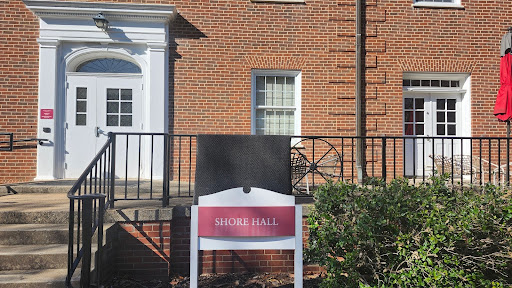Community Senate is supposed to be a representational body that embodies the needs and desires of Guilford’s traditional student body.
How would you feel about your political opinions being represented by that body?
On Feb. 8, sophomores Daniel Raeder and Rose McIntyre presented a proposal to Community Senate concerning Amendment One. The proposal was passed at the Feb. 15 meeting.
Now, Community Senate will take a public stance opposing Amendment One, joining such institutions as North Carolina Central University, North Carolina State University, and Appalachian State University.
Before exploring the numerous questions other Senate-goers had about the proposal, let’s take a step back.
Amendment One, also referred to as the North Carolina Same-Sex Marriage Amendment, strives to clarify and redefine what kind of domestic unions will be recognized by the state.
According to Associate Professor of Political Science and Community Senate Faculty Advisor Maria Rosales, the intent and possible effects of Amendment One are commonly misinterpreted.
“This proposed amendment is written very broadly,” said Rosales. “So some people are saying it says ‘marriage is between a man and a woman’ and it doesn’t actually say that at all. It says the only legal domestic union that will be recognized or considered valid by the state is a marriage between a man and a woman.”
Nicole Guilfoyle, senior and vice president of Guilford Pride, agrees.
“It basically nullifies any relationship that isn’t a heterosexual marriage,” said Guilfoyle. “This is just one example, but if you have a man and a woman living together and there’s domestic abuse, there’s not as good of a chance of the abuser getting tried because they’re not in a marriage.”
However, the real issue for Guilford’s student government is whether or not Senate should declare a position on political issues at all.
This issue came to a head this week when one student blocked the proposal, making it the first block of the year.
“Senate should be a representation of the entire school,” said first-year Alexander Morales. “I feel like there are people and certain cultures of this school that aren’t being represented suitably. … We should really be focused on issues that are really pressing here. We have a really big agenda and that just took away a day’s worth of agenda items.”
Guilfoyle, however, sees it another way.
“First of all, I feel it’s really hard as a representational body for Senate to represent every interest on campus,” said Guilfoyle. “That’s just not possible. But even so, I still feel that as a college that emphasizes core values of equality, then we have a mission to do this.”
In Raeder’s view, this issue is less political than it seems.
“This is standing up for our fellow students and our faculty members and our staff,” said Raeder. “And it may take a political tone, but at its heart it’s community standing for community. There’s a difference between the state trying to pass a law to try and change zoning laws and saying we’re passing a constitutional amendment — that cannot be opposed once it’s in the constitution — to discriminate and oppress a minority.”
The block remained after discussion, and the proposal went to a vote of Senate officials. This is the first time Senate has voted on an issue all year. The proposal passed, with two standing aside and one opposing.
Tim Leisman, junior and Senate diversity action chair, wished the discussion stretched on another week instead of calling for a vote.
“I’m not in favor of making decisions when not everyone is comfortable with them,” said Leisman. “Particularly when the people who are voting, such as myself, are not comfortable with taking that vote.”
There is the additional question of what this proposal actually means now that it has been passed through Senate.
“I think it would be purely symbolic,” said Rosales. “It would be that Senate is trying to suggest that they are standing in solidarity with people who are affected by this amendment.”
“Also, it’s a kind of building blocks to a call to action for our school and for the greater student body to start becoming aware of this and how it oppresses people in our community,” said Raeder.
Morales, however, thinks it is unlikely the proposal will lead to action.
“We make a lot of these statements and then don’t do anything to follow up on them,” said Morales. “So I feel like it will be mostly symbolic. I just feel like it’s not the responsibility of the Senate to make decisions like this without consulting more people.”
Leisman shares the concern that the proposal will not lead to action.
“The thing that I’m concerned about is that people will say, ‘We passed a proposal and now we did all we need to do,’” said Leisman. “‘We’re standing against hate.’ But really what we need to do is use this proposal as a launching ground to campaign for votes.”
If this issue interests you and you want to get your voice heard, Community Senate meets on Wednesdays at 7:00 in the Boren Lounge. Though, for now, Senate has put this issue to bed.





